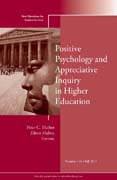
Positive Psychology and Appreciative Inquiry in Higher Education
Mather, Peter C.
Hulme, Eileen
Given the shared interest between higher education and positive psychology in developing healthy and productive human beings, this issue explores how this new subdiscipline of psychology can contribute to the mission of higher education. It presents a variety of strategies for bolstering student learning and development. The authors also draw from appreciative inquiry, which, like positive psychology, is based on studying strengths, but focuses on organizational rather than individual performance. During a time of daunting challenges, positive psychology and appreciative inquiry can help to leverage higher education’s many assets to optimize the potential of students, faculty, and staff. This is the 143 rd volume of this Jossey–Bass higher education quarterly series. An indispensable resource for vice presidents of student affairs, deans of students, student counselors, and other student services professionals, New Directions for Student Services offers guidelines and programs for aiding students in their total development: emotional, social, physical, and intellectual. INDICE: EDITORS’ NOTES 1 Peter C. Mather, Eileen Hulme 1. Appreciative Education 5 Jennifer L. Bloom, Bryant L. Hutson, Ye He, Erin Konkle Appreciative education is presented as a framework for leading higher education institutions, delivering truly student–centered services, and guiding higher education professionals’ interactions with students. 2. Cultivating Change Using Appreciative Inquiry 19 Matthew Fifolt, Lori Lander The purpose of this chapter is to describe the utility and scope of appreciative inquiry and outline the benefits of this strengths–based approach to engage in meaningful self–assessment. 3. Promoting Positive Leadership 31 Peter C. Mather, Michael Hess Drawing from positive organizational scholarship, the authors describe strategies for moving from an ineffective focus on problems to leveraging organizational strengths for productive change 4. Thriving in College 41 Laurie A. Schreiner This chapter describes the phenomenon of thriving as a deep engagement in learning experiences. The author also identifi es multiple pathways to the acquisition of thriving and characteristics of communities that support thriving students. 5. Fostering Student Engagement by Cultivating Curiosity 53 Eileen Hulme, Daniel T. Green, Kimberly S. Ladd This chapter describes the results of a study that provides a rich understanding of the role of curiosity in facilitating academic and personal success in high–achieving college students. 6. Appreciative Inquiry in Teaching and Learning 65 Laura M. Harrison, Shah Hasan This chapter challenges the contemporary narrative that suggests higher education and student learning are in decline. Prescriptions for strengthening pedagogical processes by adapting principles from appreciative inquiry are also discussed. 7. Promoting Social Justice Through Appreciative Community Service 77 Peter C. Mather, Erin Konkle Social justice and community service have strong traditions in higher education. In this chapter, the authors describe ways in which positive psychology and appreciative inquiry inform the pursuit of social justice through community service activities. 8. Resources and Readings in Positive Psychology 89 Peter C. Mather, Eileen Hulme This chapter presents a variety of resources for higher education professionals interested in applying appreciative education principles to their work. INDEX 95
- ISBN: 978-1-118-79776-1
- Editorial: Jossey Bass
- Encuadernacion: Rústica
- Páginas: 104
- Fecha Publicación: 10/12/2013
- Nº Volúmenes: 1
- Idioma: Inglés
